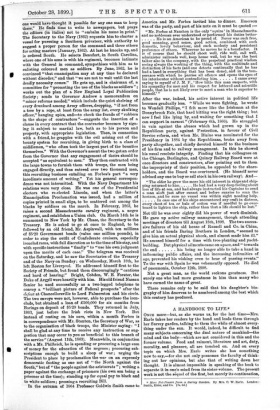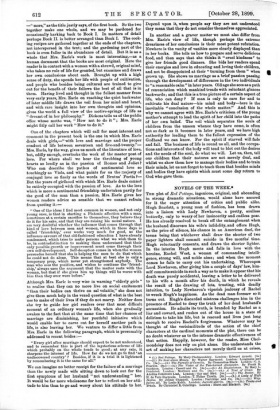A HANDBOOK TO LIFE.* ONCE more—but, as she warns us,
for the last time—Mrs. Earle takes her readers by the hand and leads them through her Surrey garden, talking to them the while of almost every- thing under the sun. It would, indeed, be difficult to find many subjects concerning the dual nature of mankind—the mind and the body—which are not considered in this and the former volume. Food and raiment, literature and art, duty, morality, and pleasure, all are touched on. And on every topic on which Mrs. Earle writes she has something new to say,—for she not only possesses the faculty of think- ing out her opinions, but also that of writing down her thought. It is almost impossible in speaking of the book to separate it in one's mind from its sister-volume. The present work is not the sequel of the first, but merely its continuation,
• More Pot-Pourri from a Surrey Garden. By Mrs. C. W. Earle. London : Smith, Elder, and Co. (7e. ad.]
—`• more," as the title justly says, of the first book. So the two together make one whole, and we may be pardoned for occasionally harking back to Book I. In matters of detail perhaps Book II. is better arranged than Book I. The cook- ing recipes are gathered together at the ends of the chapters, not interspersed in the text; and the gardening part of the book is even fuller in its abundance of detail. But it is as a whole that Mrs. Earle's work is most interesting,—as a human document that the books are most original. Here the reader is in contact with a woman with a shrewd, original mind, who takes no rule of life for granted, but examines and draws her own conclusions about each. Brought up with a high sense of duty, she spends her life with people of cultivation, and people who besides being cultured are trained to give out for the benefit of their fellows the best of all that is in them. Having lived and thought in the fullest manner from very early years, Mrs. Earle on reaching the quiet backwater of later middle life draws the veil from her mind and heart, and with rare insight into her own thoughts and opinions, gives the world a full view of the motive-springs of life as dreamt of in her philosophy." Dickens tells us of the public office whose motto was, "How not to do it " ; Mrs. Earle might fitly call her work "How to do it."
One of the chapters which will call for most interest and comment in the present book is the one in which Mrs. Earle deals with girls,—" with love and marriage and the proper conduct of life between seventeen and five-and-twenty."- Mrs. Earle, by the way, gives us much of the literature of love, but, oddly enough, overlooks the work of the master poet of love. For where shall we hear the throbbing of young
hearts BO loudly as in the passion of Romeo and Juliet? Who can describe the pathos of sentimental love so touchingly as Viola, and what paints for us the majesty of
conjugal love so finely as the words of Brutus' Portia ?— But the years of girlhood with which Mrs. Earle deals cannot be entirely occupied with the passion of love. As to the love which is more a sentimental friendship undertaken partly for the good of the man than a passion, Mrs. Earle gives her women readers advice so sensible that we cannot refrain from quoting it :—
" One of the ideas I find most common in women, and not only young ones, is that in starting a Platonic affection with a man, sometimes at a certain sacrifice to themselves, they believe they do it for his sake, and that they are raising his moral nature. I am very doubtful whether the influence that comes through that kind of love between men and women, which in these days is called 'friendship,' ever works very much for good, as the influence savours of that old-fashioned education I have already condemned, which tries to make persons what we wish them to be, in contradistinction to making them understand that their only possible growth or improvement must come through their own self-development. Self-deception comes in when the woman persuades herself that she is helping the man to do that which he could not do alone. This means that at best she is only a temporary prop, which never yet strengthened anybody. The man who sees the position, and wishes to continue the friend- ship,' always uses the argument that the matter rests with the woman, but that if she gives him up things will be worse with him than they ever were before."
Although Mrs. Earle is very wise in warning "elderly girls"
to realise that they can no more live on social excitement "than their bodies can thrive on sal volatile," she does not give them much help in the vexed question of what is the best
use to make of their lives if they do not marry. Neither does she try to guide her girl readers over that most difficult moment of an ordinary woman's life, when she gradually awakes to the fact that at the same time that her chances of
marriage are diminishing, her youthful initiative which would enable her to carve out for herself another path in life, is also leaving her. We venture to differ a little from Mrs. Earle in the following paragraph, which is presumably addressed to recent brides :—
" Every girl after marriage should expect to be not understood, and to remember this is part of the mysterious scheme of life which probably on the whole tends to good; at any rate, it sharpens the interest of life. How far do we not go to find 'an undiscovered country' P Besides, if it is a trial it is lightened by remembering it is the same for all."
We can imagine no better receipt for the failure of a marriage than the newly made wife sitting down to look out for the
first symptoms of her husband "not understanding" her. It would be far more wholesome for her to reflect on her atti- tude to him than to go and worry about his attitude to her. Depend upon it, when people say they are not understood they mean that they do not consider themselves appreciated.
In another and a graver matter we must also differ from Mrs. Earle's view of life, though perhaps the extreme dreariness of her conclusions is their most potent refutation. Nowhere is the vanity of vanities more clearly displayed than in her books. She tells us how to prepare and serve delicious food, and then says that she thinks it "cruel kindness" to give her friends good dinners. She bids her readers spend their energies and love in educating and loving their children, and not be disappointed at their "turning from them" when grown up. She shows us marriage as a brief passion passing through the development of differences in the two individuals to "a reasonable calm" in later years. Old age she sees as a path of renunciation which mankind treads with reluctant glances backwards; and that this is a true picture of a certain aspect of life, who can deny ? If man is only to care for and to cultivate his dual nature—his mind and body—here is the inevitable "conclusion of the whole matter." And this is why we cannot agree with Mrs. Earle's criticism of the young mother's attempt to lead the spirit of her child into the paths of her own belief. The veil which separates the souls of children from the unseen whence they have come, is often not so dark as it becomes in later years, and we have high authority for leading them to the fullest expression of the Godhead we can know. For the spirit if starved will fade and fail. The business of life is round ne all, and the occupa- tions and interests of the body will tend to blot out the desires and the needs of the soul, do what we will. Let us, then, tell our children that their natures are not merely dual, and whilst we show them how to manage their bodies and to train their minds, let as not forget to teach them that besides minds and bodies they have spirits which must some day return to God who gave them.







































 Previous page
Previous page